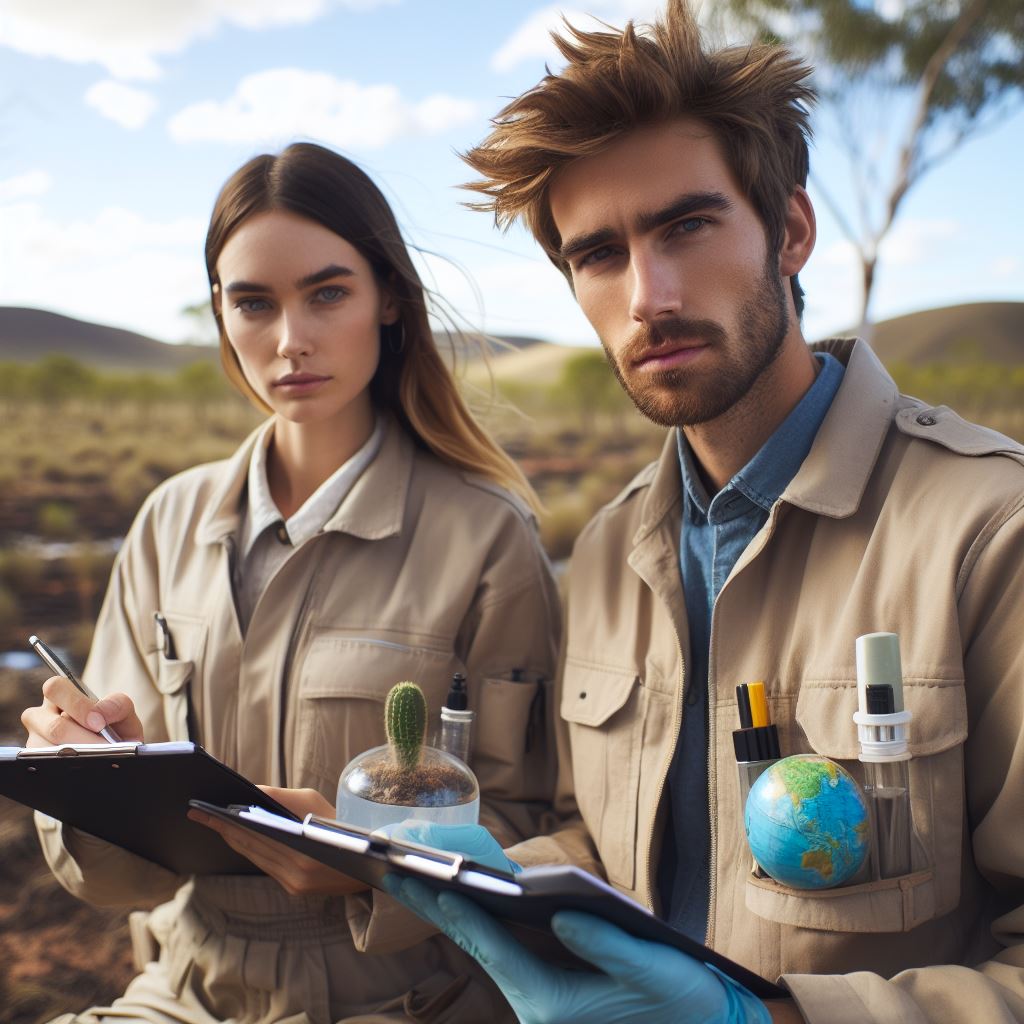Introduction
Environmental Science, a multifaceted discipline, encompasses the study of ecosystems, biodiversity, pollution, climate change, and sustainable development, aiming to understand and mitigate human impacts on the environment.
In Australia, the importance of Environmental Science cannot be overstated, as the continent faces unique environmental challenges, including habitat destruction, water scarcity, biodiversity loss, and climate variability.
With a growing awareness of these issues, coupled with stringent environmental regulations and policies, the field has experienced significant expansion in recent years.
The growth of Environmental Science in Australia has led to a plethora of career opportunities across various sectors, such as environmental consultancy, government agencies, non-profit organizations, research institutions, and education.
From conducting environmental impact assessments to implementing conservation strategies and advocating for sustainable practices, professionals in this field play a vital role in shaping Australia’s environmental future.
Education and Qualifications Required
Obtaining a Relevant Degree in Environmental Science
Having a relevant degree in Environmental Science is crucial for individuals aspiring to work in the field. This educational background provides a strong foundation of knowledge and skills necessary to succeed in environmental science careers.
Universities and Institutions Offering Environmental Science Programs in Australia
- University of Melbourne – offers a Bachelor of Science in Environmental Science
- University of Queensland – offers a Bachelor of Environmental Science
- Australian National University – offers a Bachelor of Science in Environmental Studies
- University of Sydney – offers a Bachelor of Environmental Systems
Recommended Courses and Subjects for Aspiring Professionals
To excel in the field of Environmental Science, aspiring professionals should consider taking the following courses and subjects
- Environmental Chemistry – provides an understanding of how chemicals interact with the environment.
- Ecology – explores the interactions between organisms and their environment.
- Environmental Policy and Management – covers the legal and regulatory aspects of environmental protection.
- Climate Change Science – focuses on the study of climate systems and the impact of climate change.
- Environmental Impact Assessment – teaches the process of evaluating the potential environmental effects of projects.
- Environmental Data Analysis – equips individuals with skills in analyzing and interpreting environmental data.
- Sustainability and Resource Management – emphasizes the sustainable use and management of natural resources.
- Fieldwork and Practical Experience – provides hands-on experience in conducting environmental research and assessments.
By completing these courses, aspiring professionals will acquire a comprehensive understanding of environmental science principles and practices. Additionally, these courses will enhance their critical thinking, research, and problem-solving skills, which are highly valued in the industry.
Moreover, individuals should also consider joining student organizations and participating in internships or research projects related to environmental science. These experiences provide practical exposure to real-world environmental issues and further develop relevant skills.
Overall, investing in a relevant degree in Environmental Science from reputable universities and institutions in Australia, while pursuing recommended courses and gaining practical experience, greatly increases the chances of securing the first job in the field of Environmental Science.
Gaining Practical Experience
Emphasize the significance of internships and work placements
- Internships and work placements are invaluable for gaining practical experience in environmental science.
- These opportunities provide hands-on training and allow you to apply theoretical knowledge in real-world settings.
- Employers highly value candidates with practical experience, making internships crucial for launching your career.
Provide information on internships and job placement resources in the field
- Research and identify internships specifically in the environmental science sector.
- Consult university career centers, online job boards, and specialized environmental organizations for internship listings.
- Networking with professionals in the field can also lead to internship opportunities.
Discuss the benefits of volunteering with environmental organizations
- Volunteering allows you to contribute to environmental causes while gaining valuable experience.
- Working with environmental organizations exposes you to various aspects of the field and expands your professional network.
- Volunteer roles often involve hands-on fieldwork, data collection, conservation efforts, and community engagement.
- These experiences showcase your dedication and passion, enhancing your employment prospects.
Overall, securing practical experience in the field of environmental science is crucial for your career growth. Internships and work placements provide hands-on training and make you stand out to potential employers.
Additionally, volunteering with environmental organizations allows you to contribute to meaningful causes while expanding your knowledge and network. Embrace these opportunities to pave your way towards a successful career in environmental science.
Building a Professional Network
Highlight the Importance of Networking in Environmental Science
- Networking is crucial in environmental science as it helps in creating valuable connections.
- Building a strong network can lead to job opportunities, collaborations, and professional growth.
- Connecting with professionals in the field can provide insights, knowledge, and mentorship.
- Networking allows you to stay updated with industry trends, research, and new job openings.
- Developing relationships with experts can enhance your credibility and reputation in the field.
Provide Tips for Attending Industry Events and Conferences
- Prepare beforehand by researching the event, speakers, and organizations attending.
- Dress professionally and bring business cards, resume, and a notepad to take relevant notes.
- Engage in conversations and introduce yourself confidently to fellow attendees and speakers.
- Ask insightful questions during panel discussions or presentations to get noticed.
- Participate in workshops, seminars, or volunteering opportunities to connect with professionals.
Discuss the Benefits of Joining Professional Associations and Organizations
- Being a part of professional associations provides access to a wide network of environmental scientists.
- Membership offers opportunities for professional development through workshops and training.
- Associations organize conferences and events specifically catering to environmental science professionals.
- You can gain exposure and visibility in the field through presenting research or speaking at conferences.
- Membership often includes access to job boards, newsletters, and exclusive industry insights.
- Networking with like-minded professionals in associations can lead to collaborations and career prospects.
Building a strong professional network is essential to kickstarting your career in environmental science. It not only helps you stay updated with the latest industry trends, research, and job openings but also provides valuable connections, collaborations, and mentorship opportunities.
Attending industry events and conferences is a great way to network. Preparing beforehand, engaging in conversations, and asking insightful questions can help you stand out among fellow attendees and establish professional relationships.
Additionally, joining professional associations and organizations in the environmental science field offers numerous benefits. You gain access to a wide network of experts, professional development opportunities, conferences, and industry-specific insights.
Being part of these associations can boost your credibility, visibility, and open doors to potential collaborations and job prospects.
Therefore, actively invest your time and effort in building and nurturing your professional network, as it can greatly contribute to a successful career in environmental science.
Read: Navigating Chem Grad Studies in Australia
Showcasing relevant skills and experiences
Employers in the field of environmental science typically look for certain key skills and experiences.
- Fieldwork experience: Employers value candidates who have practical experience conducting environmental research and fieldwork.
- Technical skills: Proficiency in laboratory techniques, data analysis, and use of environmental monitoring equipment is highly desirable.
- Knowledge of environmental policies and regulations: Familiarity with local and national environmental laws and regulations demonstrates commitment and understanding.
- Communication skills: Clear and effective communication, both written and verbal, is crucial for sharing research findings and collaborating with team members.
- Problem-solving abilities: Employers seek individuals who can identify and address environmental problems using critical thinking and ingenuity.
To highlight these skills in resumes and cover letters, consider the following tips
- Include a specific section for relevant coursework, lab experiences, and fieldwork, highlighting any research projects or hands-on learning.
- Use action verbs when describing experiences and accomplishments, such as “conducted,” “analyzed,” or “collaborated.”
- Quantify achievements whenever possible. For example, mention the number of samples analyzed or the successful completion of a project within a set timeframe.
- Tailor the resume and cover letter to each specific job application, emphasizing skills and experiences relevant to the position.
Creating a strong online presence, especially through platforms like LinkedIn, is becoming increasingly important
- LinkedIn allows you to showcase your skills, experiences, and professional network to potential employers.
- Update your profile regularly, including relevant coursework, certifications, and any new experiences or projects.
- Connect with professionals in the environmental science field, participate in relevant groups and discussions, and follow influential organizations.
- Highlight your achievements and contributions, including any published research papers, presentations, or awards.
- Request recommendations from professors, mentors, or colleagues who can speak to your abilities and potential.
By following these tips, you can effectively showcase your skills and experiences, increasing your chances of securing your first job in environmental science in Australia.
Read: Innovative Chemistry Startups in Australia
Job search strategies and resources
Tips for searching for job opportunities in Environmental Science
- Create a targeted resume highlighting relevant skills and experiences.
- Research companies and organizations in the environmental sector.
- Network with professionals in the field through events and online platforms.
- Join industry-specific associations and attend their conferences and workshops.
- Utilize social media platforms to connect with potential employers and stay updated on job postings.
- Regularly check job boards and websites for environmental science-related job listings.
Online job portals and websites specifically focused on the field
- GreenCareer is a popular online platform providing job listings in the environmental sector.
- Seek.com.au often features job opportunities in environmental science and related fields.
- Envirojobs.com.au is a dedicated website for environmental job seekers in Australia.
- The Australian Government’s job website, jobsearch.gov.au, often lists positions in the environmental sector.
- LinkedIn can also be a valuable resource for finding job opportunities and connecting with professionals.
Potential benefits of seeking guidance from career advisors or mentors
- Career advisors can provide personalized guidance on job search strategies and improving your resume.
- They can offer insights into the industry and help you identify potential career paths.
- Mentors can provide valuable advice based on their own experiences in environmental science.
- They can help expand your professional network by introducing you to relevant contacts.
- Mentors can offer ongoing support and guidance throughout your career journey.
By following these tips, utilizing online job portals, and seeking guidance from career advisors or mentors, you can increase your chances of securing your first job in environmental science in Australia.
Read: Must-Attend Chemistry Conferences in Aus

Uncover the Details: Networking in Australia’s Enviro Science Sphere
Your Personalized Career Strategy
Unlock your potential with tailored career consulting. Get clear, actionable steps designed for your success. Start now!
Get StartedInterview preparation and success
Tips for preparing for interviews in the Environmental Science industry
- Research the company’s mission, projects, and values to show your knowledge and interest.
- Familiarize yourself with the role and its responsibilities, so you can relate your skills and experiences.
- Prepare specific examples of how you have contributed to environmental sustainability in previous roles or projects.
- Practice answering potential interview questions to build confidence and articulate your thoughts effectively.
- Dress professionally and bring copies of your resume and any relevant certifications or references.
- Arrive early and make sure you have researched the interview location and parking options.
- Prepare questions to ask the interviewer, demonstrating your interest in the company and the role.
Common interview questions and how to answer them effectively
Tell me about yourself
Highlight your relevant education, experiences, and skills that make you a suitable candidate for the job.
Why are you interested in working in the Environmental Science industry?
Discuss your passion for environmental sustainability and how you want to contribute to making a positive impact.
What experience do you have in environmental research or fieldwork?
Share any relevant academic projects, internships, or work experience that involved research or fieldwork.
How do you handle data analysis and interpret scientific findings?
Describe your proficiency in data analysis tools and your ability to draw meaningful conclusions from scientific data.
How do you manage your time and prioritize tasks?
Explain your organizational skills, ability to multitask, and stay focused on key objectives.
Have you faced any challenges in previous environmental projects, and how did you overcome them?
Discuss a specific challenge, explain the actions you took to address it, and emphasize the positive outcome.
How do you stay up-to-date with current environmental regulations and trends?
Mention any memberships in professional organizations, involvement in conferences or seminars, and regular reading of industry publications.
How do you work within a team or collaborate with colleagues?
Highlight your communication skills, adaptability, and ability to work effectively in a team environment.
The importance of researching the organization and demonstrating passion for environmental sustainability
- Researching the organization shows your genuine interest and dedication to the role and the environmental science industry.
- It allows you to tailor your answers during the interview to match the organization’s values and objectives.
- Showing passion for environmental sustainability during the interview demonstrates your motivation to make a difference.
- Employers in this industry are often looking for candidates who genuinely care about protecting the environment.
- Demonstrating your knowledge of the organization’s projects and how you can contribute helps you stand out from other candidates.
- Passion and dedication are qualities that can set you apart and make a lasting impression on the interviewers.
By following these interview preparation tips, answering questions effectively, and showcasing your passion for environmental sustainability, you increase your chances of successfully landing your first job in Enviro Science in Australia. Good luck!
Read: The Future of Green Chemistry in Australia
Conclusion and encouragement
In closing, securing your first job in environmental science in Australia requires a strategic approach.
Networking, gaining relevant experience, and honing essential skills are key to breaking into the field.
Utilize internships, volunteer opportunities, and industry events to expand your professional network.
Tailor your resume and cover letter to highlight your passion, skills, and relevant qualifications for environmental roles.
Stay updated on industry trends, environmental regulations, and emerging technologies to enhance your competitiveness.
Be proactive in seeking out job opportunities and don’t hesitate to reach out to potential employers.
Consider pursuing further education or certifications to bolster your credentials and stand out in the job market.
Be persistent and adaptable in your job search, and don’t be discouraged by setbacks or rejections.
Attend career fairs, workshops, and informational interviews to gain insights and advice from industry professionals.
Demonstrate your commitment to environmental stewardship and sustainable practices throughout the job application process.
Be prepared to showcase your problem-solving abilities, teamwork skills, and passion for environmental conservation.
Remember that landing your first job may take time, patience, and perseverance, but your efforts will pay off.
Stay motivated and continue to invest in your professional development to achieve your career goals in environmental science.
With determination and the right approach, you can embark on a rewarding career in environmental science in Australia.




